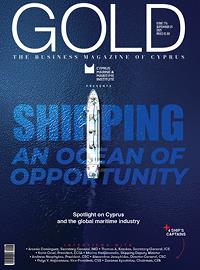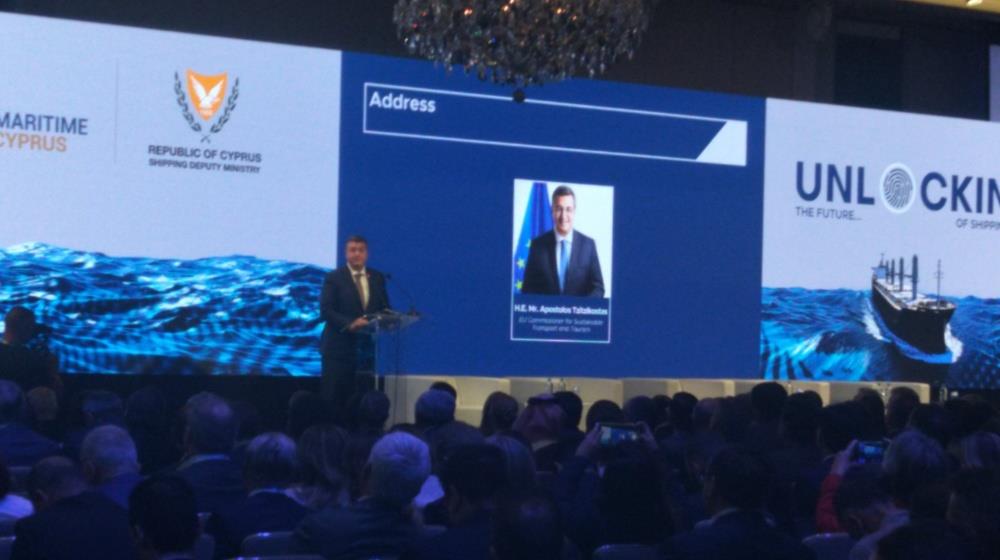“Cyprus is a global maritime force. It is a hub of the crossroads of Europe, Asia and Africa, with a proud history and modern fleets that ranks among the largest in the European Union. Your flag is really a symbol of quality and trust,” Apostolos Tzitzikostas, EU Commissioner for Sustainable Transport and Tourism said, addressing Maritime Cyprus in Limassol.
He continued that the shipping industry was not only the core of the secret economy, “but also a pillar of Europe's maritime strength and your voice carries weight, not just in Europe, but across the global shipping community.”
Tzitzikostas said that Cyprus understands the sea “and what it means for our security, our prosperity and our future and the maritime sector. Our seas and how we cross them is precisely what brings us here today.”
The EU official said the challenge today was not only keeping the maritime sector resilient but also competitive, more sustainable and more secure.
“So let me start with competitiveness. The Draghi Report highlights the EU's declining share of the global maritime fleet. Our fleet keeps growing in absolute terms, but others are extraordinary, faster. Our market share in gross tonnage fell from 38.5 in 2003 to 33.6 n 2024. This a challenge we must face together, European Commission, the member states and the industry, and we are active.”
He continued that in January, the competitiveness compass was launched, “our policy roadmap with three major priorities, closing the innovation gap with the US and China, aligning decarbonization with competitiveness and stepping up security.”
“We follow this with a clean industrial deal, which is turning sustainability goals into a competitive advantage for European industries, and this has direct meaning for the maritime sector. At a European level, decarbonizing the maritime sector is happening on a step by step basis,” he said, continuing, “The current legislative framework provides elite predictability. It allows ship owners to plant their investments in retrofitting new technologies and to address the challenges of decarbonisation.
The Commissioner also said that he would next month present a sustainable investment plan, “boosting the development of alternative fuels for transport, because it's one thing to ask for sustainability, and another, if you cannot find the fuels to be sustainable. But shipping is global, and so must be the solutions".
He underlined that the global measures agreed by the IMO aimed to create a level playing field worldwide. “And this is much needed, a level playing field globally is the only way forward, and Europe will continue to lead with ambition, supporting the IMO.”
“However, my dear friends,” the Commissioner continued, “let me be clear, the competitiveness of the European shipping sector is my top priority and it's also the priority of the European Commission and I don't need to explain to this audience what it means losing ground in the competitiveness of this sector for Europe. So in my view, solutions must be pragmatic, efficient, economically viable and based on common sense and the realities of today.”
“Therefore,” Tzitzikostas said, “I have already instructed my services in Brussels to work hand in hand with you in the coming months to guarantee that the guidelines will address your very valid concerns and that will secure a viable compliance path.”
“Our focus, ladies and gentlemen, must be safeguarding shipping, promoting fair trade, and strengthening global connectivity,” the Commissioner said, “But shipping, as you know, is more than ships at sea, it is also about builders, innovators and technology providers.”
He suggested that Europe's ship building industry faces today unfair competition from other regions of the world allowing competitors to sell ships 30% or 40% cheaper than the European models.
“And China is not alone in this. This is why we are preparing in Brussels right now, an industrial maritime strategy aiming to reinforce competitiveness and resilience of our shipping sectors, and this will be presented during the EU Council presidency of Cyprus,” he said.
According to Tzitzikostas, at its core, this strategy will be innovation clean technologies, a renewed focus on good use assets “and, of course, schemes and fair competition.”
“The strategy will also support the production and adoption of clean vessels and port equipment, propose measures to improve the business environment and promote digitalization,” he said, going on to underline. “But let me again be clear, public funding
is not and will not be enough. We estimate that the sector will require 40 billion euros per year in new investment, and that means mobilising both private and public finance.”
“I see huge opportunities for ports as energy hubs, supporting importing and producing clean energy, including offshore wind and hydrogen, making Europe's energy supply chain more resilient,” he said.
Tzitzikostas also noted that, “Under the current geopolitical context Europe is being heavily tested by hostile actors and transport is at the very heart of our resilience. So protecting transport networks and ensuring troop mobility across our continent are not negotiable for us.”
The Commissioner said that dual use investments benefit both the defence and the security of Europe, and also its economy, “deeper berths, larger docks, better logistics also have commercial operators, so ports must be equipped to load oversized equipment, have more storage and be connected to those operating and their ownership and management must remain secure in times of crisis.”
This, he said, was why the EU, together with NATO and EU member states, identified priority military mobility corridors across all transport modes.
“But connectivity, as you know, is more than infrastructure. You must also remove regulatory barriers, simplify procedures and ensure sufficient transport assets. This is why the Commission is preparing a comprehensive military mobility package by the end of the year to eliminate all the bottlenecks and strengthen Europe's ability to act,” Tzitzikostas elaborated.
“Of course, ambition must emerge with investments. So I'm very pleased that the Commission's proposal for the long term EU budget includes a refund connecting Europe's facility for transport, with a total budget rising from €25 billion to €52 billion, with a 10 times bigger budget for military mobility, for dual infrastructure projects from €1.7 to 70 billion,” he said.
“Europe is changing, having learned from its past mistakes, understanding the difficulties and the challenges of the present and the future,” he said, going on to say that he would conclude by looking ahead, “Cyprus, as you know, will soon take on the responsibility of the EU presidency, and I believe it will be a defining moment for Europe and for the transport policy, especially because this presidency is happening under the very successful and visionary leadership of Nicos Christodoulides.”
“As a great maritime nation", Tzitzikostas continued, “Cyprus will play a leading role in shaping the maritime industrial strategy, the board strategy and the military mobility package, and it will also play a key role in the first ever European strategy for tourism that we are also preparing and presenting in March next year. Cyprus will also have discussion on the next EU's long term budget, and this will be decisive in setting the level of ambition of our transport and maritime sectors. I trust that Cyprus will be a strong ally in ensuring ambitious funding for a competitive, resilient and secure European transport system, funding that will set transport, including maritime transport, on track for a competitive, resilient and secure future.”
“Early 2026 will be a big moment for Cyprus, and it will also be a very big moment for European transport, because together, ladies and gentlemen, we can make it a moment that defines our maritime future,” the Commissioner concluded.









